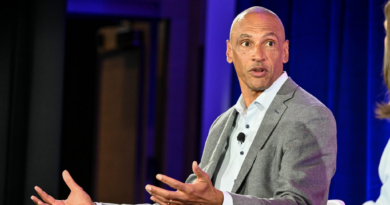Brian Moynihan has some advice for Elon Musk when it comes to running the DOGE—but it may not be the Tesla CEO’s style
Bank of America CEO Brian Moynihan knows a thing or two about running complex, historic institutions.
But his advice on running a new Department of Government Efficiency (DOGE) may fall on deaf ears when it comes to the project’s leads: Tesla CEO Elon Musk and entrepreneur Vivek Ramaswamy.
Musk, in particular, is known to command his companies in unique ways—whether by firing most of a business’s staff or sleeping in his offices and factories.
While the richest man on the planet’s approach has clearly paid off in some areas, it has damaged others. X, for example, suffered outages because the employees who could fix the platform when it broke had left.
Moynihan suggests a more tempered approach to reducing federal agency costs, particularly if the institutions are to remain efficient.
“You have to be careful in the broadest context, because the federal government’s another component of the economy. So if you shrink it, the question has to be made up by the private sector and other places,” Moynihan told PBS News Hour in an interview on Tuesday.
“The theory is it will be made up by other places because at the end of the day, it’s debt-financed, which is squeezing out other forms of financing,” he added.
The 65-year-old CEO seemed confident that Musk and Ramaswamy could streamline government agencies: After all, “you can make any place more efficient.”
Moynihan highlighted that at BofA, costs in 2010 were in the high-$60 billion to $70 billion range.
Despite inflationary pressures and the better part of two decades since, the bank will have costs of around mid-$60 billion this year.
“That was for efficient and working digitization, automation, everything,” Moynihan explained. “So I’m confident they can get there, but you have to do it in a rational fashion that ensures it sticks to the ribs. Otherwise, if you cut it, it’ll come right back.”
Rational may prove to be something of a judgment call. Musk has made his attitude apparent, and it’s already made federal workers nervous.
The SpaceX founder posted on his social media platform last month that he has a “mandate to delete the mountain of choking regulations that do not serve the greater good.”
Likewise, the man worth $349 billion is already setting the tone for working conditions at the DOGE, saying the team will be made up of “super high-IQ small-government revolutionaries willing to work 80+ hours per week on unglamorous cost-cutting.”
While Musk is hunting for revolutionaries, Moynihan suggests charting a path that will be adhered to for good: “The challenge for the government is, can you get the cuts to stick to the ribs?” he said.
“Ronald Reagan was going to do it. Al Gore was going to do it. George W. Bush was going to do it. Barack Obama was going to do it. Everybody was going to make government more efficient—and it’s hard because there’s complexities to it.”
Customer service
Another differentiating factor between Musk’s business endeavors and his mandate at the DOGE is whom he ultimately has to answer to.
At Tesla, it’s his shareholders: a group of people who support the CEO to the tune of a $100 billion pay package.
The story is similar at X, though the Big Tech billionaire also has significant skin in the game courtesy of the funds he sunk into the $44 billion purchase.
And while Musk clearly doesn’t want the platform to fail, he retains the autonomy to publicly call out Fortune 500 CEOs by name and accuse them of an advertising boycott.
The story in government is different. One cannot simply tell the House, Senate, or American public to “go f–k yourself.”
“At the end of the day, they’re serving the American people. So can it be more efficient? There’s no question. You have to do it carefully so you don’t disrupt service,” Moynihan highlights.
“I wouldn’t worry about the economic impact as much as I worry about—we got to make sure the core services operate, the IRS runs properly, the banking regulatory authorities run properly, the SEC runs properly, because capital formation comes in.
“On the other hand I guarantee you, with any company, any enterprise—this enterprise—there’s always efficiencies you can gain if you go at it the right way, by eliminating the work to be automated. Then you can get the efficiencies that stick.”




